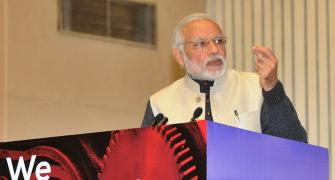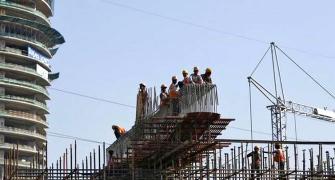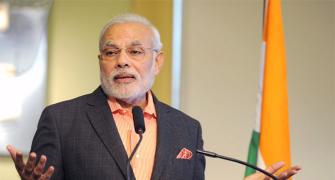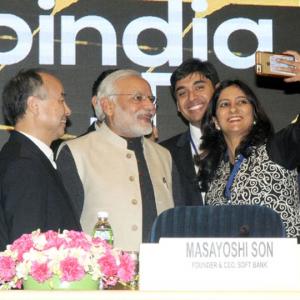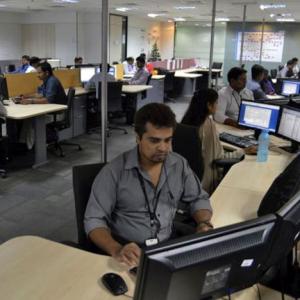Information technology, not manufacturing or infrastructure, should be the focus of the government while implementing initiatives such as Make in India and Start Up India, write columnists, Amit Bhartia & Saurabh Singh in an open letter to Prime Minister Narendra Modi.

Dear Mr Modi,
As India specialists for the last 25 years, we have seen seven prime ministers and numerous cycles of the Indian economy.
But we have never written to any prime minister, because we never believed in any of them that much.
We think you can transform India. It is this trust that inspires us to write this letter to you.
As India's portfolio manager, you need ideas that create millions of jobs, despite massive constraints of capital in a complex environment, and a limited, though visible, gestation period.
You have undertaken several interesting initiatives such as Make in India and Start Up India.
These are extraordinary ideas with long-term potential, but unluckily have material, near-term challenges.
We believe an effective answer is the significant domestic information technology (IT) spend and not manufacturing.
Manufacturing not the answer
Let us first highlight why manufacturing or infrastructure will not easily achieve the results we are looking for.
Just because it has worked for China, doesn't mean India will get to reap similar rewards.
First, China has built a massive overcapacity in most areas. This, along with massive infrastructure spend in the last 20 years, has given it an unrivalled competitive edge.
A case in point: Even with the renminbi appreciating significantly against the rupee (which should help Indian exports and hurt Chinese imports), India's trade deficit with China has increased from just $1 billion in 2004 to $50 billion in 2015.
While policy initiatives to improve our infrastructure and relax the rigidity of labour laws are underway, fixing these will take time and the opportunity cost of this time is significant for our country.
Second, the Indian domestic market is not large or deep enough to purport the quantum of demand we would need and following an "exports-led" manufacturing policy exposes us to the vagaries of unreliable global demand and currency moves.
Third, environmental costs associated with manufacturing are significant.
China can afford to pay this but with 18 of our cities already among the most polluted cities, we cannot sustain, let alone propagate, any further detrimental impact.
We agree that a focus on manufacturing will work in areas such as defence or railways and this should be pursued. But vested interests are entrenched and despite your best efforts, no significant domestic orders have been released as yet.
Mr Prime Minister, we have been told that you like cricket; so we will use a cricket cliche: we have to play to our strengths.
A world-class IT architecture in line with Make in India
At this juncture, our biggest strength is our prowess in IT.
Indian firms have built systems for much of the world, thereby bolstering their productive capacity.
Maybe, now it's time to use this in-house talent to impact India's gross domestic product (GDP) growth trajectory.
We recommend looking at IT from a different lens: classifying IT spending as infrastructure (India spends just three per cent of GDP on IT, which is minuscule by global standards).
The government, in partnership with the private sector, should create a world-class IT architecture, linking bank accounts, police and tax records and other departments.
We couldn't have done this 10 years back but now with Aadhaar, it can be done.
For an estimated $1 billion worth of IT projects, 500,000 to 700,000 jobs could be created.
Based on industry estimates, every IT job created generates three additional jobs in an informal sector - a sizeable multiplier effect.
If software jobs growth reverts to 18 per cent from the current 12 per cent, India can add 1.8 percentage points to its GDP.
To put this in perspective, the IT industry is the largest private employer with a 3.7-million employee base and has created indirect employment for 10 million.
First, the impact of spending can result in a massive growth boost and unlike other investments, payback will be quick.
Tax revenues of Brazil have risen by five per cent, as its massive investments in IT have paid off.
Second, the multiplier impact is huge. IT, as a sector, touches multiple domains, thus amplifying improvement in productivity.
It will aid the ailing real estate sector that will help both rural and urban incomes.
Third, the IT sector is non-polluting, does not require any land clearance and there is an abundance of talent. All this means that the implementation and the impact will be near-instantaneous.
Fourth, unlike the infrastructure sector, sector balance sheets are not stretched and thus, IT companies can easily explore growth opportunities and produce quicker results.
In our understanding, IT companies have been reluctant to take up government work because of a complicated bidding process, delayed payments and the menace of corruption.
Why not create a National Highways Authority of India-type organisation headed by technocrats that will award projects to private players in line with global practices?
Fifth, there is an option to create disruptive technologies as well as export this architecture to the rest of the world.
This is in line with the vision of Start Up India and Make in India. There are numerous instances of government spending having resulted in significant innovations in the US.
As portfolio managers we dream of business that can grow 10X or 20X. We have no doubt this is a 100X return project, if not more.
Sir, they say Rome was not built in a day, but we believe the first few bricks were the most important.
IT, in our humble opinion, is that brick for India: a low-risk, high-return and readily implementable brick.
The authors are fund managers and Amit Bhartia is chief investment officer, GMO's Emerging Domestic Opportunities Fund. The views are personal.


